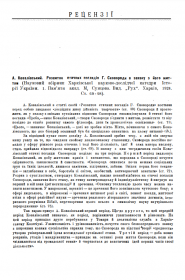Review of A. Kovalivskyi. Development of ethical views of H. Skovoroda in connection with his life (Scientific collection of Kharkiv Research Department of History of Ukraine. 1. In memory of academician M. Sumtsov. Rukh Publishing House. Kharkiv, pp. 69-98). In Notes of the Historical and Philological Department, Book V, 1924-1925, pp. 229-233.
Keywords:
Skovoroda studies, practical philosophy, history of philosophy, philosophy of Ukrainian emigrationSynopsis
Viktor Petrov reviews the article by Andrii Kovalivskyi, focusing on 1) the key principles of the latter's understanding of the ethical views of Hryhorii Skovoroda's philosophy; 2) the researcher's tracing of their transformations during the life of the wandering philosopher. First, Petrov emphasises the importance of Kovalivskyi's ‘stage’ view of Skovoroda's entire philosophical work, which is represented by the author's ‘three periods of creativity’. In his opinion, these periods reflect changes in both Skovoroda's personal mindset and the socio-historical context in which he lived. In his debate with Kovalivskyi, Petrov highlights the theses with which he disagrees. Firstly, he does not share Kovalivskyi's opinion that the asceticism, irrealism, symbolism and general pessimism characteristic of Skovoroda's first period of work are due to the philosopher's personal break with his social environment. Instead, Petrov argues, this specificity is due to ‘the conditions of historical life in eighteenth-century Ukraine’ (p. 230) and the general decadence of Skovoroda's philosophy, which was heavily influenced by the Alexandrian philosophy of Philo, Plutarch, Plotinus, and Origen. Secondly, Petrov undermines Kovalinskyi's thesis about the universalism of Skovoroda's ethical views, which are characteristic of the second period of his work. In Petrov's opinion, extra-communal and ascetic tendencies are inherent not only in the first period, but in Skovoroda's entire philosophy, which makes it contradictory and impossible to practice fully. In conclusion, Petrov agrees with Kovalivskyi that it is necessary to describe all the contradictions in Skovoroda's philosophy in order to confirm the hypothesis of its dialectical nature.
Vlada Davidenko
Downloads




